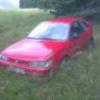-
Posts
212 -
Joined
-
Last visited
Content Type
Profiles
Forums
Events
Posts posted by B-R-T
-
-
injection manifold service? does that refer to the intake manifold which is the black plastic on the front of the engine?
I believe he meant the fuel rail
-
You forgot to tell them to check the movement of caliper guides, cuz those things like to seize up. If it happens grease up the bolts that hold the caliper and move in and out to grease up inside of the guide.
"Make sure you place a dirty rag around your brake fluid reservoir BEFORE pushing the calliper into the cylinder as fluid is likely to overspill and will make a mess of your drive and engine bay... Doh!"
Doh!, you shouldn't add any brake fluid when it gets low because of brake pads are getting thin.. When you're pushing the pistons in, you're just restoring the original level of brake fluid.. Doh!
-
I have last fall done this job to my daughter's 04 Corolla S using virtually the same technique. Question - Is the use of locktite really necessary if I tightented the bolts adequately?
No, it's not necessary
-
Greetings,
I'm hoping someone can give me some advise. I don't believe my adjustment from inside to outside air is working. Would that be a fuse or a vacume line? Any help would be appreciated.
Thanks,
You gotta be more specific, dude.
What kind of adjustment are you talking about?
-
First of all.. Why do you want an upgrade?
Do you want it stiffer or softer?
-
What exactly do you want to do?
Do you want it to be double form the manifold (separate manifolds for 2 exhaust ports) or do you want to just have 2 mufflers?
If you want to have double-from-manifold system you gotta get a spare manifold, and a piece of pipe to be made to two-piece manifold. Then you gotta get two catalyc converters (same flow), pair of resonators (inline "mufflers") and pair of mufflers.
If you only want to get two-muffler system you gotta find a Y-pipe, two mufflers and a piece of pipe. Get it to a muffler shop to get it bent and welded.
The second choise is not going to give anything performance-wise, cuz most of the backpressure that is created is created at the exhaust manifold and catalyc converter. If you are going to leave stock manifold and single cat you are not doing anything.. It's just for looks. But it's easier and cheaper way to go..
-
maybe the cargo net for the Matrix will fit in your Corolla.
Maybe a piece of ducktape would do?

-
actually sometimes you gotta pound it with a hammer to get it off the hub. we having this problem quite often at our dealership. you gotta puond the tire form the inside side few times, the turn the tire and puond a few times there. It should come off at some time. Just don't hit the rim, only hit the tire. It's better to put some kind of plank or some kind of other piece of wood on a tire, cuz sharp edges of a hammer can damage a tire
-
Hey I'm looking for a go web page/book for installing a turbo on a 2001 celica
i drive a civic that i already turboed {peace of cake} but i cant find any thing for celicas {not so easy}
so in short any help would be great
thanks
Nothing easier than boosting that motherf*****. Go to ebay, get a turbo exhaust manifold for your engine, get a decent turbo for your engine cc's (is it 1.8?. find a turbo that has a copressor efficiency map and do some calculations), bring it to a good muffler shop to fit a downpipe (you gotta find an outlet flange for your turbo). Then get a reliable wideband A/F ratio meter with a gauge, a boost gauge and a piggyback ECU and start tuning! A knock detector would be a good addition if you want to be 100% sure, that you are not going to fu** up your engine. If you are not going above 7 - 8 psi of boost, you'll probably be good with your engine internals. Air filter-turbo-intercooler-throttle plumbing shouldn't be very hard to fabricate from aluminum pipes and silicon couplings.
P.S. Always check your A/F ratio. If it's getting too lean even when you are adding maximum duty cycle for your injectors with a piggyback - get bigger injectors or increase your fuel pressure with an aftermarket FPR. If fuel pressure gets too low during hard acceleration - get a higher flow fuel pump. I suggest to get an inline one, cuz they are easier to install
-
It's not making that sound when cold, because metal expands when heated. That means your engine is not badly damaged yet. That's why you don't have any lockup occuring.
Milage doesn't mean anything if engine was built crappy. S*it happens.
If you haven't changed oil frequent enought it could damage main bearings too.
-
It's not a bakcfire if RPM needle is steady.
Could be something in transmision or power steering pump.
-
Check for vacuum leaks (hissing sound when engine is running).
Idle air control valve could be failing.
EVAP purge valve could be failing.
MAF, fuel system is not likely. It cannot increase engine speed without more air coming in.
-
If your combination (or part of it - the metering valve) valve is failing you cannot simply check it. This valve delays hydraulic pressure for the disk brakes until pressure is enought to apply the drum brakes. If it's failing it will cause the nose dive. But if drum brakes are not operational at all it will cause the same thing plus disk brakes will have to do all 100% of braking and most likely overheat.
Check operation of rear brakes. If it's working - change the valve.
-
I had a 2003 Corolla LE(Totaled...not my fault...lol) which was a manual transmission, and now my replacement vehicle is a 2004 Corolla S model. Both cars idled the exact same way you are describing when started cold...so I would say it's a normal Corolla thing on that lol As for the oil thing, I have been told thats normal as well.
engine would stall if it was running at low RPM during cold starts
-
Why? Truth hurts?
-
We both are decent mechanics if we have the book to guide us.
You are crappy mechanics if you need a book to guide you...
-
Did check engine light came on?
Do RPM changes (drops/raises) during "popping"?
Cold engine cannot preignite because of the carbon deposits.
-
..may have been allowing air to be pulled back into the coolant when we cooled down...
How?
-
3S-GTE. It was stock on same year GT-Four (JDM), so it shouldn't be too hard to do the swap. And it's the same family of engines you have. Your engine is 3S-FE - nonturbo, with "economic" head.
Great car you have. I'm planning to get one like yours too
 I love those classic Celicas <_<
I love those classic Celicas <_< -
P0135 - Oxygen sensor 1, bank 1, heater control - circuit malfunction. I suggest to check fuse, wiring, and then sensor. If everything is OK - malfunction in ECU.
Chocking could be caused by ECU making mixture way too ritch because of the malfunctioning oxygen sensor heater.
-
A140E is an "electronic" version. I can't tell you for sure.. But I think you will need a different ECU to control that transmission
-
bump...i hear its better to put the clutch disk on while the tranny is out on the bench
That was a good one










-
I forgot. DON'T pump the brake while bleeder valve is open. It will suck air again to the hydraulic system. When pedal drops - close the valve and only then you can repeat the procedure.
And more.
BRAKE FLUSHING.
a.k.a. brake fluid change.
It's similar to brake bleeding, except you have to force ALL brake fluid out the brake system while adding new fluid to the master cylinder reservoir. One wheel at a time. Always watch brake fluid level inside the reservoir. Refill before it becomes empty. If you pump brakes with reservoir empty, air will get into the hydraulic system. "Bleed" the brakes until you see your fresh, clear brake fluid coming from the bleeder valve.
Brake fluid should be changed according to your manufacturers recommendations. If you don't now the recommendations you should change the brake fluid at least once in a 50 000 mile period.
Never use engine oil, auto tranny oil or power steering oil in your brake system. It will cause leaks from hoses and master cylinder will start to develop lower pressure because of the leaking piston seals.
-




manual transmission poping out of gear.
in Corolla Club
Posted
Worn synchronyzer? Worn gear teeth? Damaged gearshift mechanism?
There could be alot of reasons.. but because it's only for one gear I would guess it's synchronyzer or gear teeth